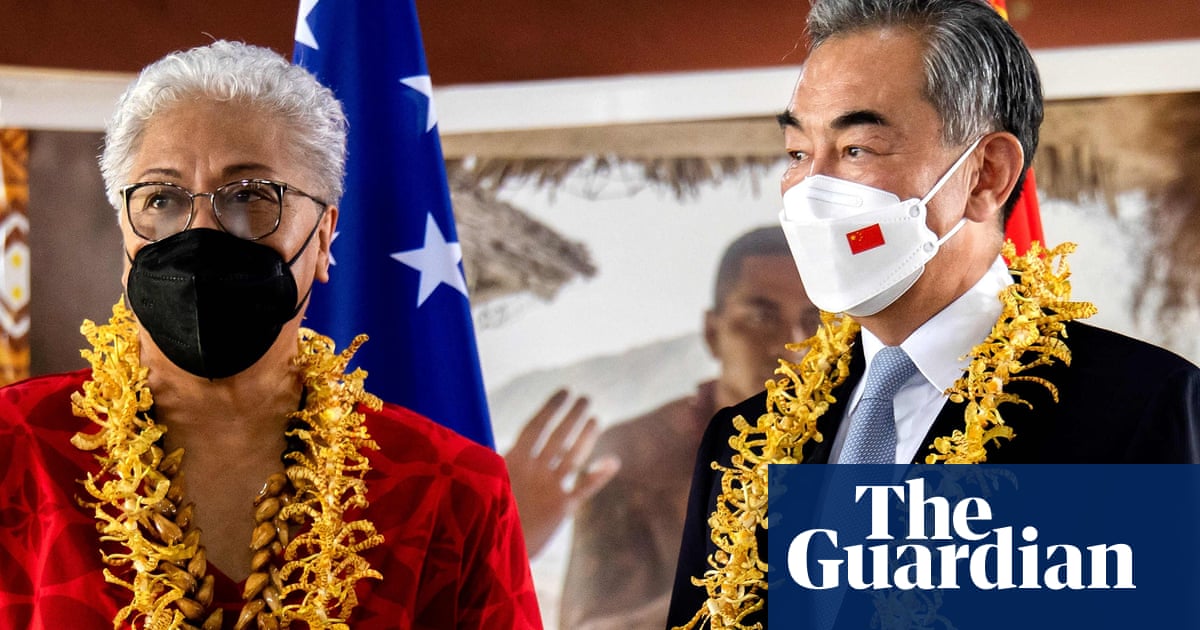
Samoa signed a bilateral agreement with China on Saturday, promising “greater collaboration”, as Beijing’s foreign minister continues a tour of the Pacific that has sparked concern among western allies.
The deal’s details are unclear, and come midway through a Chinese delegation’s eight-nation trip – but an earlier leaked draft agreement sent to several Pacific countries outlined plans to expand security and economic engagement.
The mission has prompted western leaders to urge regional counterparts to spurn any Chinese attempt to extend its security reach across the region.
The Samoan government confirmed in a press release on Saturday that the Chinese foreign minister, Wang Yi, and the Samoan prime minister, Fiame Naomi Mata’afa, had met and discussed “climate change, the pandemic and peace and security”.
Local media were invited to witness the signing of a deal, but no questions were taken. Previously, journalists seeking to cover the Solomon Islands leg of Wang’s tour for international outlets said they were blocked from attending press events, while those journalists allowed access were extremely limited in their ability to ask questions.
The Samoan release said China would continue to provide infrastructural development support to various Samoan sectors and there would be a new framework for future projects “to be determined and mutually agreed”.
“Samoa and the People’s Republic of China will continue to pursue greater collaboration that will deliver on joint interests and commitments,” the release said.
While not addressing the Samoa-China agreement specifically, the newly elected Australian prime minister, Anthony Albanese, said on Saturday the previous federal government had “dropped the ball” in its dealings with Pacific nations.
“The truth is, the former government had a submission from [the department of] foreign affairs and trade, backed by the former foreign minister at the time Marise Payne, for increased aid in the Pacific, and they ignored,” he said.
“We’ll be proactive in the region and we want to engage. Australia has been the partner of choice for a long period of time in the Pacific and we continue to do that.”
The Chinese delegation has already visited Solomon Islands and Kiribati this week. The delegation arrived in Samoa on Friday night and was to depart for Fiji on Saturday afternoon, with other stops expected to be Tonga, Vanuatu, Papua New Guinea and East Timor.
In a duel for influence, Australia’s new foreign minister, Penny Wong, was in Fiji on Friday, seeking to woo island states after Solomon Islands took Canberra by surprise last month by signing a wide-ranging security pact with China. The draft agreement and a five-year plan circulated to several Pacific nations would give China a larger security footprint in a region seen as crucial to the interests of the US and its allies.
“We have expressed our concerns publicly about the security agreement,” Wong told reporters in the capital of Suva.
“As do other Pacific islands, we think there are consequences. We think that it’s important that the security of the region be determined by the region. And historically, that has been the case. And we think that is a good thing.”
The prime minister of Fiji praised Wong after the meeting, while also taking a swipe at Australia’s former prime minister Scott Morrison.
Frank Bainimarama said on Saturday he had a “wonderful meeting” with Wong after she travelled to the country in her first solo overseas visit since being sworn in.
“Fiji is not anyone’s backyard – we are a part of a Pacific family,” Bainimarama later wrote on Twitter.
“And our greatest concern isn’t geopolitics – it’s climate change.”
He said the meeting would strengthen Fiji and Australia’s Vuvale Partnership, using a Fijian word meaning “friendship”.
The post included a photo of Bainimarama and Wong smiling and shaking hands.
Bainimarama appeared to be taking a thinly veiled swipe at former prime minister Morrison, who in 2019 referred to the Pacific as Australia’s “backyard”.
At the first stop in Honiara on Thursday, China’s Wang lashed out at “smears and attacks” against the security pact already signed with Solomon Islands.
In a stark letter to fellow Pacific leaders, the Federated States of Micronesia president, David Panuelo, warned the agreement seemed “attractive” at first glance but would allow China to “acquire access and control of our region”.
On Friday, Wang met Kiribati’s president, Taneti Maamau, for discussions on fisheries, education and health, during the four-hour stop. Kiribati was focused on trade and tourism opportunities with China, and wasn’t keen on a security arrangement, according to a Kiribati official, who was not authorised to speak to media.
The official said a controversial plan to reopen a protected marine zone for fishing, and to upgrade an airstrip on Canton island, were not among agreements due to be signed.
Chinese state media lauded the Kiribati trip as a significant milestone in the bilateral relationship, which only formally resumed in September 2019 after Kiribati switched recognition from Taiwan to Beijing. According to China Daily, Wang said China was “not only the friend of Kiribati, but also the most reliable friend of all the developing countries”.
It said both sides had agreed to increase cooperation on Covid-19, and that a Chinese medical team had arrived with the delegation to assist with the pandemic response and provide health services to Kiribati people. The state-backed outlet also said the two sides had agreed to expand Belt and Road Initiative (BRI) development and to “give full play to Kiribati’s advantages in resources” and create new maritime cooperations “on the premise of ecological protection”.
The readout did not mention security measures but railed against the US for “hindering China’s development”.
With Agence France-Presse and Reuters


